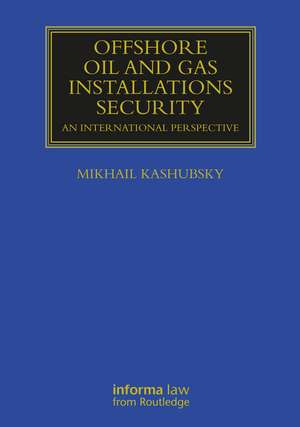Offshore Oil and Gas Installations Security: An International Perspective: Maritime and Transport Law Library
Autor Mikhail Kashubskyen Limba Engleză Paperback – 18 dec 2020
But, how common are attacks on offshore oil and gas installations? Who attacks offshore installations? Why are they attacked? How are they attacked? How is their security regulated at the international level? How has the oil industry responded? This timely and first of its kind publication answers these questions and examines the protection and security of offshore oil and gas installations from a global, industry-wide and company-level perspective.
Looking at attacks on offshore installations that occurred throughout history of the offshore petroleum industry, it examines the different types of security threats facing offshore installations, the factors that make offshore installations attractive targets, the nature of attacks and the potentially devastating impacts that can result from attacks on these important facilities. It then examines the international legal framework, state practice and international oil and gas industry responses that aim to address this vital problem. Crucially, the book includes a comprehensive dataset of attacks and security incidents involving offshore oil and gas installations entitled the Offshore Installations Attack Dataset (OIAD).
This is an indispensable reference work for oil and gas industry professionals, company security officers, policy makers, maritime lawyers and academics worldwide.
Din seria Maritime and Transport Law Library
- 9%
 Preț: 1590.25 lei
Preț: 1590.25 lei - 9%
 Preț: 728.42 lei
Preț: 728.42 lei - 18%
 Preț: 782.44 lei
Preț: 782.44 lei - 9%
 Preț: 571.38 lei
Preț: 571.38 lei - 18%
 Preț: 1362.73 lei
Preț: 1362.73 lei - 8%
 Preț: 453.14 lei
Preț: 453.14 lei - 26%
 Preț: 1521.98 lei
Preț: 1521.98 lei - 26%
 Preț: 1629.02 lei
Preț: 1629.02 lei - 25%
 Preț: 741.53 lei
Preț: 741.53 lei - 26%
 Preț: 1295.20 lei
Preț: 1295.20 lei - 34%
 Preț: 1404.44 lei
Preț: 1404.44 lei - 26%
 Preț: 737.44 lei
Preț: 737.44 lei - 26%
 Preț: 1356.41 lei
Preț: 1356.41 lei - 26%
 Preț: 1693.48 lei
Preț: 1693.48 lei - 18%
 Preț: 1225.22 lei
Preț: 1225.22 lei - 8%
 Preț: 244.98 lei
Preț: 244.98 lei - 25%
 Preț: 855.76 lei
Preț: 855.76 lei - 26%
 Preț: 1577.15 lei
Preț: 1577.15 lei - 15%
 Preț: 568.28 lei
Preț: 568.28 lei - 29%
 Preț: 1404.44 lei
Preț: 1404.44 lei - 29%
 Preț: 1290.87 lei
Preț: 1290.87 lei - 18%
 Preț: 1612.87 lei
Preț: 1612.87 lei - 18%
 Preț: 1825.08 lei
Preț: 1825.08 lei - 18%
 Preț: 2352.77 lei
Preț: 2352.77 lei - 25%
 Preț: 597.51 lei
Preț: 597.51 lei - 25%
 Preț: 599.31 lei
Preț: 599.31 lei - 15%
 Preț: 222.69 lei
Preț: 222.69 lei - 25%
 Preț: 964.18 lei
Preț: 964.18 lei -
 Preț: 332.03 lei
Preț: 332.03 lei - 26%
 Preț: 1691.68 lei
Preț: 1691.68 lei - 26%
 Preț: 1354.45 lei
Preț: 1354.45 lei - 26%
 Preț: 1526.83 lei
Preț: 1526.83 lei - 15%
 Preț: 696.05 lei
Preț: 696.05 lei - 29%
 Preț: 1026.98 lei
Preț: 1026.98 lei - 26%
 Preț: 1404.44 lei
Preț: 1404.44 lei - 29%
 Preț: 652.77 lei
Preț: 652.77 lei - 18%
 Preț: 1276.34 lei
Preț: 1276.34 lei - 26%
 Preț: 1682.74 lei
Preț: 1682.74 lei - 18%
 Preț: 1612.39 lei
Preț: 1612.39 lei - 29%
 Preț: 1023.49 lei
Preț: 1023.49 lei
Preț: 1413.55 lei
Preț vechi: 1974.77 lei
-28% Nou
Puncte Express: 2120
Preț estimativ în valută:
270.48€ • 283.16$ • 223.81£
270.48€ • 283.16$ • 223.81£
Carte tipărită la comandă
Livrare economică 05-19 aprilie
Preluare comenzi: 021 569.72.76
Specificații
ISBN-13: 9780367737146
ISBN-10: 0367737140
Pagini: 520
Dimensiuni: 174 x 246 mm
Greutate: 0.96 kg
Ediția:1
Editura: Taylor & Francis
Colecția Informa Law from Routledge
Seria Maritime and Transport Law Library
Locul publicării:Oxford, United Kingdom
ISBN-10: 0367737140
Pagini: 520
Dimensiuni: 174 x 246 mm
Greutate: 0.96 kg
Ediția:1
Editura: Taylor & Francis
Colecția Informa Law from Routledge
Seria Maritime and Transport Law Library
Locul publicării:Oxford, United Kingdom
Public țintă
Professional ReferenceCuprins
1: Offshore Petroleum Security Context
2: Offshore Assets and Operations
3: Offshore Security Threats
4: Offshore Targets Selection Considerations
5: Legal Status of Offshore Installations
6: Pre-9/11 International Regulatory Framework
7: Post-9/11 International Regulatory Responses
8: International Oil and Gas Industry Responses
9: Conclusions
2: Offshore Assets and Operations
3: Offshore Security Threats
4: Offshore Targets Selection Considerations
5: Legal Status of Offshore Installations
6: Pre-9/11 International Regulatory Framework
7: Post-9/11 International Regulatory Responses
8: International Oil and Gas Industry Responses
9: Conclusions
Notă biografică
Dr Mikhail Kashubsky is a Senior Lecturer at the Centre for Customs and Excise Studies (CCES), Charles Sturt University and Head of Secretariat of the International Network of Customs Universities (INCU). He is a barrister and solicitor of the Supreme Court of the Australian Capital Territory and the High Court of Australia and an Honorary Customs Officer of the Republic of Azerbaijan. He is also a member of the Editorial Board of the Customs Scientific Journal.
Recenzii
"A recent addition to Informa’s Marine and Transport Law Library, this is rather a terrific book. Yes, it will be of abiding interest to international and environmental lawyers, but the clarity of the author’s prose style will make it accessible, not to mention fascinating, to everybody and anybody interested in this subject which, according to author Mikhail Kashubsky, has hitherto been surprisingly neglected." - Phillip Taylor MBE and Elizabeth Taylor, Richmond Green Chambers, United Kingdom
Descriere
How common are attacks on offshore oil and gas installations? Who attacks offshore installations? Why are they attacked? How are they attacked? How is their security regulated at international level? How has the oil industry responded to improve the security of offshore installations? How can the existing security arrangements of offshore instal
